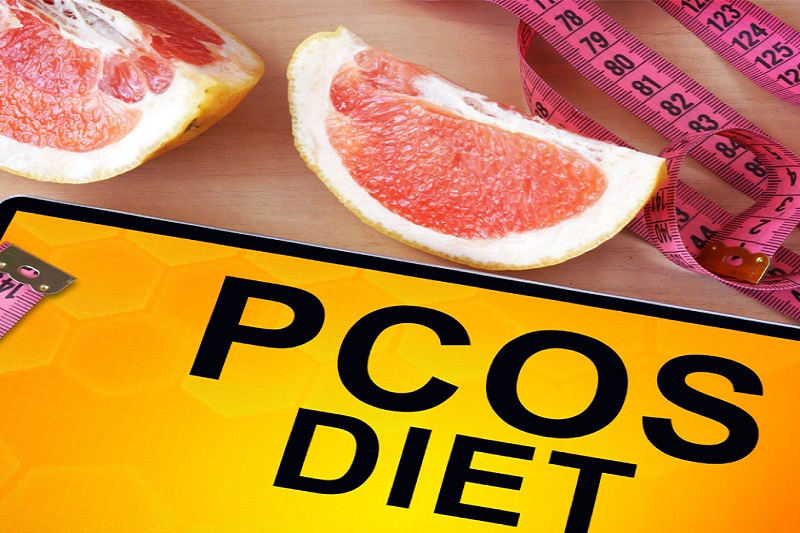About PCOS
Polycystic Ovarian Syndrome (PCOS) is a hormonal issue that affects women during their reproductive years. Women or girls might not have regular periods if they have PCOS. Or perhaps they could also experience lengthy menstrual cycles. A hormone called androgen may be present in a woman’s body in excess.

Along the ovary’s outer edge, several tiny sacs of fluid form in women with PCOS. These are commonly known as ‘cysts’. The developing eggs in the tiny cysts are filled with fluid. They are known as follicles. The follicles stop releasing eggs on a regular basis.
Symptoms of PCOS
PCOS symptoms frequently appear around the time of the first menstrual cycle. Sometimes, after having periods for a while, symptoms appear later. Different PCOS symptoms exist. Women are given a PCOS diagnosis when they experience at least two of the below issues:
-
Irregular Periods:

PCOS is frequently characterized by irregular or infrequent menstrual cycles. Having periods that last several days or longer than what is normal for a period is also acceptable. Women might, for instance, experience less than nine periods a year. Also, those intervals may be greater than 35 days. Women can experience difficulties conceiving.
-
Polycystic Ovaries:

A woman’s ovaries could be larger. On the ovary’s border, many follicles carrying immature eggs may be created. It’s possible that the ovaries may not function properly.
-
Excessive Androgen:

Excessive body and facial hair may come from high androgen levels. Medically, this condition is known as ‘Hirsutism’. Severe acne and male-pattern baldness can also occur occasionally.
Does PCOS relate to mental health, how?
Polycystic Ovarian Syndrome (PCOS) is a complex illness having effect on a person’s physical and also emotional health. Anxiety and depression are almost three times as common in PCOS patients than in the general population. Additionally, anxiety and depressive symptoms are far more frequently reported by those with PCOS, and they are also much more likely to be severe.
Although sadness and anxiety have received the most attention in the study on PCOS and mental health, bipolar disorder, eating disorders, and OCD may also be more common in those with PCOS.
The Link Between PCOS and Eating Disorders
Exercising habits and disordered eating surely affect the body’s hormone production since it is obvious that PCOS is linked to eating disorders.
According to research, women with PCOS engage in disordered eating behaviors at a rate that is four times higher than that of women without PCOS. Women with PCOS reported considerably more binge episodes and more frequent instances of compulsive exercise in the past month than did the controls, according to studies.
Behaviors associated with eating disorders, including binge eating or restriction, have an impact on the body’s hormone production, which can result in disorders caused by hormonal dysfunction or impairment.
On the other hand, it appears that PCOS-positive women report a “much greater prevalence of form and weight concerns.” Medical doctors frequently advise women with PCOS to diet since they tend to weigh more and have a higher tendency to gain weight. This focus on fitness and weight is a risk factor for the psychopathology and behaviors of eating disorders.
Diagnosis of PCOS:
How do medical professionals counsel PCOS patients after a diagnosis? The weight of duty and therapy was frequently placed on the patient since obesity was once thought to be one of the causes of PCOS. It now seems that in women who already have a genetic predisposition to PCOS, weight increase simply makes the disorder worse and speeds up its onset. Despite this, doctors still frequently suggest weight loss as a treatment in the first instance.
However, since the majority of those with PCOS have insulin resistance and the condition frequently results in further weight gain, losing a few pounds might be extremely challenging for them. Moreover, it has been demonstrated that PCOS interferes with healthy appetite regulation, raising the risk of binge eating. Things quickly spiral out of control when PCOS symptoms like sadness and low body image are added, with many people feeling the need to shed weight by any means necessary.
Forms of Eating Disorders:
The PCOS-associated eating disorders are as follows:
-
Bulimia Nervosa
The syndrome is additionally referred to as the binge-purge syndrome. It describes recurring events in which a person eats a lot of food quickly (bingeing), followed by attempts to purge the food from their system (purging), typically done via:
- Fasting
- Vomiting
- Using diuretics or laxatives
- Vigorous exercise
Self-induced vomiting is the most popular of these techniques. Bulimics experience guilt, shame, and remorse following binges and feel bad about themselves.
-
Binge Eating Disorder
Similar to bulimia nervosa, this illness is characterized by recurring episodes of binge eating but not purging. After a binge episode, the person is extremely distressed. Obese or overweight people are more likely to develop binge eating disorder.
-
Night Eating Syndrome
Those who suffer from night-eating syndrome typically eat little during the day and then wake up hungry at night. People who are fat frequently exhibit this pattern of eating. Stress and depression can be factors that lead to night eating.
What can be done?
Consult the doctor and the PCOS care team if eating disorder symptoms are observed. Women with PCOS will benefit from care, counseling, and support groups to help them adopt a more positive attitude toward food and their bodies. Eating disorders are complicated psychological conditions.
It might be challenging to treat PCOS in conjunction with an eating issue because PCOS typically calls for weight management. For example, a continuous desire to lose weight can cause an eating disorder to recur. Patients will need a group of specialists with knowledge of PCOS and eating issues. Medical professionals, psychotherapists, and licensed nutritionists make up the perfect interdisciplinary team. Contact your physician, PCOS care team, or healthcare provider as a first step.
Summary:
Speak with the healthcare practitioner or a healthcare expert if one’s eating is out of control. Healing is a process and is not as simple as just eating or not eating too much. Recovery from an eating disorder takes time, and the person who has it must acquire new coping skills and strategies to control their emotions, recognize their triggers, and handle stress without turning to food or destructive habits.

